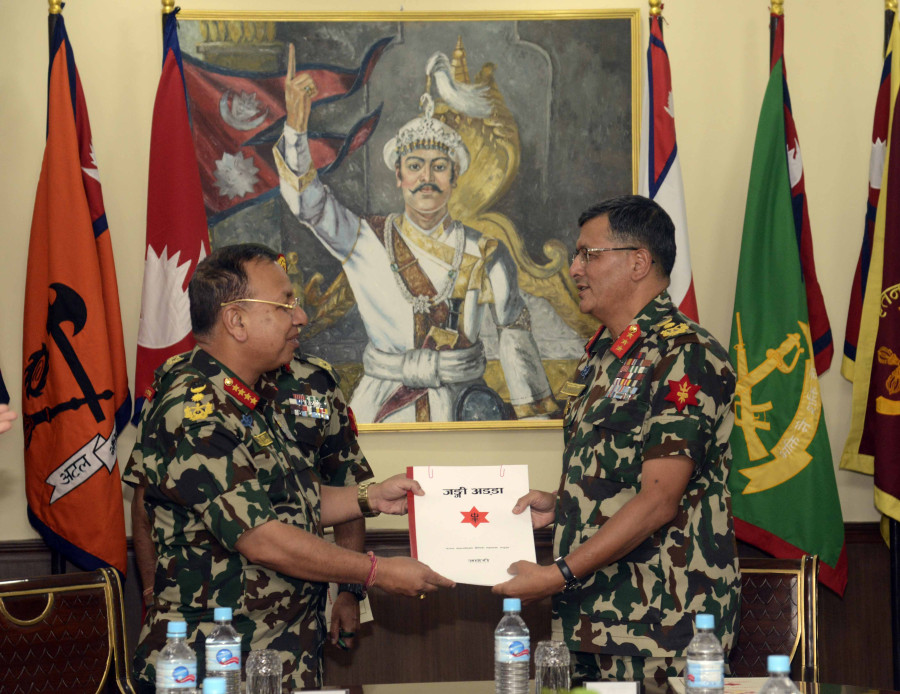National
New chief faces daunting task rebuilding Nepal Army’s image
Current and former Army officials who know Lt Gen Purna Chandra Thapa describe him as a “competent official” with a rich experience in defence matters—both inside and outside Nepal.
Binod Ghimire
Lt Gen Purna Chandra Thapa’s former colleagues call him the perfect man to transform the Army, someone who can inspire soldiers as a leader, while continuing to instil values in an institution that has been marred by scandals and controversies.
When he formally takes charge as the new chief of army staff next month, Thapa will need all of the skills, coupled with a bit of luck and discipline, as the responsibility to command the 92,000-strong national defence force comes at the time when the Army leadership faces allegations of deviating the force from its core job while indulging in commercial activities.
Thapa will lead the Army as its acting chief for a month—he was appointed as the interim chief on Thursday—before President Bidya Devi Bhandari appoints him as the Chief of Army Staff on September 9. Following the handover, incumbent CoAS Rajendra Chhetri goes on a month-long leave.
Current and former Army officials who know Thapa describe him as a “competent official” with a rich experience in defence matters—both inside and outside Nepal. In his 39 years of service, Thapa has commanded a company, a battalion, a brigade and a division of the Army. He has been praised in the ranks for the leadership skills he demonstrated during the decade-long insurgency in Maoist hotspots across the country.
Born to a military family in Lamjung, Thapa has served in four separate missions of the United Nations Peacekeeping Operations around the globe. He first became a platoon commander of the Nepali contingent in the UN Interim Force in Lebanon (UNIFIL) in 1986, followed by a duty officer at the UNIFIL Headquarters three years later. Thereafter, he joined the UN Mission in Bosnia and Herzegovina. His most important responsibility came as the head of mission and force commander—a rare opportunity for a Nepal Army officer in UN Peacekeeping missions—of the UN Disengagement Observer Force in Golan Heights from February 2015 to February 2016.
Besides military courses at home, Thapa has completed training in the United States and India.
hapa, in addition to becoming the first Army chief who has done a Command and Staff College course in Nepal, will become the first general to reach the Army’s top rank after getting his term extended as a lieutenant general. In 2016, the Maoist-led government of Pushpa Kamal Dahal extended his term, preventing him from having to retire.
“I believe Gen Thapa is a good pick to lead the Army,” said retired Maj Gen Binoj Basnyat. “He has every quality to transform the Nepal Army as he succeeds Chhetri, who has had an average performance during his three-year tenure.”
Basnyat says that since the country has embraced federalism, Thapa should focus on regaining the Army’s value while restructuring its way of deployment based on an assessment of the opportunities and threats. Capacity development, according to Basnyat, should be another focus of his three-year tenure. “The Army needs to be equipped with the latest arms and ammunition,” he added.
The national defence force practices centralised leadership with the chief holding authority over various resources, including the Army Welfare Fund. “The most crucial thing is to maintain transparency of welfare fund, government budget, or development funds,” Basnyat said.
Incumbent CoAS Chhetri and his predecessor Gaurav Shumsher Rana were embroiled in controversies for using these funds in non-transparent manners. Contracts awarded to rebuild the Tri-Chandra Military Hospital and various sections of the Kathmandu-Tarai Fast Track were.
A retired general who spoke to the Post on condition of anonymity because he was close to current army officials said there is an immense expectation on Thapa to break the echo chamber formed by Chhetri during his tenure. “There are very competent officials who need to be given right opportunities,” the general said. “We cannot expect changes if some of the officers in crucial positions continue to remain there.”
The retired officer said the newly-minted chief also faces a challenge in managing the transitional justice. “The success and failure of the transitional justice process is very much dependent on how the Army perceives it,” he said. So far, Nepal Army has not fully cooperated in the process, arguing that all actions it took during the insurgency were directed by the government of that time, not the Army.
Former Lt Gen Balanada Sharma said it is high time the Army sets a rigid criterion on the kind of construction works it should be involved in. As Thapa takes charge, Sharma said he should work in getting government funding for its welfare activities so that it doesn’t have to focus on generating income.
“I believe the national security policy which the government is preparing to bring into effect will fix the do’s and don’ts for the institution,” he told the Post. “Gen Thapa has huge opportunities to prove himself—and only time will tell if he is different from other chiefs, or is more of the same.”




 13.12°C Kathmandu
13.12°C Kathmandu














